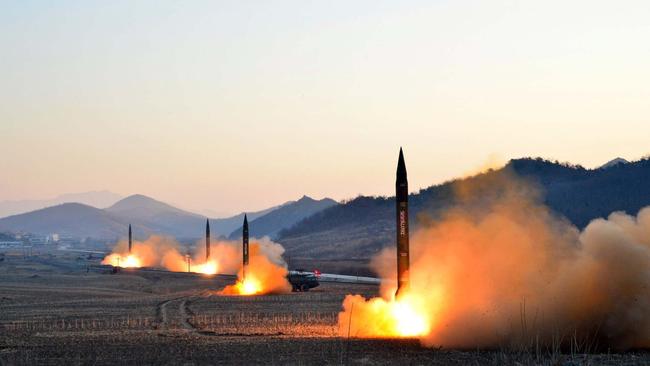Korean crisis is the X factor that could rattle markets in 2017
A rapid escalation in Korean tensions means a military showdown could be the X factor that roils markets in 2017.

In 2016 the X factor was undoubtedly the election of Donald Trump as US President. At the start of 2016, few anticipated the election result and the subsequent market reaction.
It’s early days, but my nomination for the 2017 X factor is the Korean crisis, which has rapidly escalated in the last few weeks, including a desperate and unprecedented warning from China yesterday about the danger of a looming war.
China fears that whereas President Obama tended to blink and take no action in a military crisis (Syria, Ukraine, South China Sea), President Trump has made it clear he will not be pushed around by anyone and especially not North Korea because of the threat the rogue nation state poses to South Korea and Japan. China fears that could mean war — conceivably nuclear war.
The sharemarket was not moved by last night’s Korean drama but the bond market usually reacts before the sharemarket. The 10-year bond yield jumped as bond prices fell, pushing the US dollar higher.
My first understanding that Korea could be the market X factor actually came from Kevin Rudd. Rudd may not have been a brilliant Prime Minister (he is not alone in that classification) but he is one of the world’s best minds when it comes to events in Asia.
Last December, when asked by ABC 7.30 host Leigh Sales to name the most pressing challenges in our region, Rudd nominated three: “North Korea, North Korea and North Korea.”
“We’re on a technical trajectory. It’s to do with North Korean technical capabilities in terms of missile sophistication, missile range, the availability of nuclear material and the ability to militarise that into a warhead.”
That’s diplomatic language for saying that within a year North Korea maybe able to fire nuclear weapons at both South Korea and Japan and is well on in the way to being able to launch a nuclear attack on Los Angeles and Darwin.
Rudd said the issue was escalating “on a very rapid timescale” and if there was no agreement between the US and China on how this could be arrested, “the alternatives are too horrible to talk about”.
Rudd’s predicted escalation came rapidly. First, when earlier this month North Korea fired test missiles into the Sea of Japan, and then later when it apparently arranged the assassination in Malaysia of the North Korean dictator’s older half-brother.
In reaction, China surprised the world by imposing a freeze on North Korea’s exports of coal to China, which during 2016 rose strongly and were North Korea’s main export.
But the Chinese action had no effect at all on North Korea which responded by firing more missiles into the Sea of Japan and detaining all Malaysian citizens in Korea after Malaysia uncovered details of the assassination.
Those details include the fact that North Korea now has access to one of the world’s most deadly chemical weapons, which it could potentially use against South Korea and Japan.
President Trump phoned Japanese Prime Minister Shinzo Abe and acting South Korean President Hwang Kyo-ahn after last Monday’s missile tests, with Abe later saying the threat from North Korea had “entered a new phase.” There is pressure in Japan to prepare for an invasion of North Korea but North Korea, if you include its reservists, appears to be the world’s largest army.
Trump responded by starting to deploy the first elements of the US’s advanced Terminal High Altitude Area Defence (THAAD) antimissile system to South Korea.
China opposes the THAAD deployment claiming THAAD destroys the regional security balance because the system’s far-reaching radar can penetrate into its territory. South Korea and the United States say the missile system is aimed only at defending against any North Korean missiles.
North Korea regards THAAD as preparation for war.
Meanwhile, the US and South Korea for some time have planned a joint military exercise next month. Trump is proceeding with those plans.
Yesterday, China, almost in desperation, called on North Korea to stop its nuclear and missile tests and for South Korea and the United States to stop joint military drills and seek talks.
Chinese Foreign Minister Wang Yi said the tests by the North and the joint drills across the border in South Korea were causing tension to increase like two “accelerating trains coming toward each other”.
“China’s suggestion is, as a first step, for North Korea to suspend nuclear and missile activities, and for the U.S. and South Korea to also suspend large-scale military drills.”
Such a “dual suspension” would allow all sides to return to the negotiating table, Wang said.
There is no doubt President Obama would have agreed with China. We await President Trump’s reaction but his previous statements would indicate there will be no backing down by the US.
And the detaining of Malaysian citizens in North Korea is another danger point. What if North Korea threatens to kill them?
We were all expecting problems in the South China Sea but China appears to have halted further militarisation of the islands it has created because it is very apprehensive about President Trump.
Given Darwin is much closer to North Korea than LA, it is a clear potential target for North Korea so maybe we should become involved in the negotiations. North Korea has similarities with the Cuban crisis, which erupted as President Kennedy came to power. He did not blink.







Almost every year there is a so-called X factor in markets — a force that suddenly and surprisingly emerges as the dominant driver of share and bond prices.